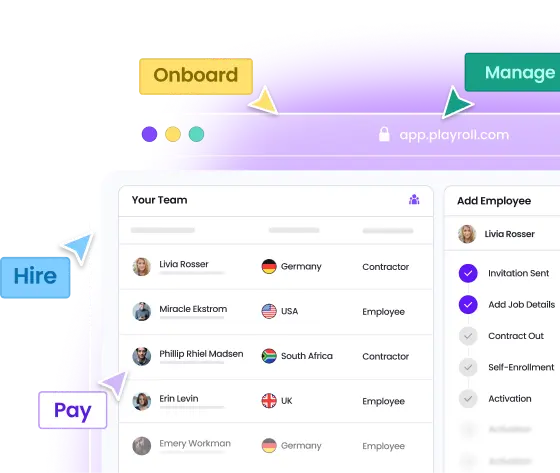What Are the Standard Working Hours In Canada?
Employees that are 18 and older typically have a maximum of 8 hours per day and 40 hours per week as standard working hours. Working hours and overtime are governed at both the federal and provincial and territorial levels. In Canada, the standard maximum is 40 - 48 hours per week depending on the province or territory. Below is a detailed table summarizing standard daily and weekly hours and overtime thresholds and rates for each jurisdiction in Canada:
Employees that are 16 or younger generally has restricted working hours, often under special rules protecting minors.
A minimum meal interval of 30 minutes must be observed by employees who work more than 5 consecutive hours in a day. In typical working hours, Monday through Friday, the hours are generally from 9:00 a.m. - 5:00 p.m., but this can vary depending on the employer and sector.
Maximum Working Hours in Canada
Legal cap on daily and weekly hours: The general maximum working hours are 8 hours per day and 40 - 48 hours per week, with the exact weekly limit varying by province or territory. For example, Ontario's Employment Standards Act allows a maximum of 8 hours per day or 48 hours per week unless overtime is paid or an exemption applies.
Exceptions and overtime: Employees may work beyond the standard hours if overtime pay is provided or if there is a written agreement. Employers must obtain approval for excess hours in some jurisdictions.
Overtime restrictions: Daily hours beyond the standard daily limit generally trigger overtime pay. Employers cannot force employees to work beyond limits without consent or without providing overtime compensation.
Industry Specific Exceptions
Healthcare: Employees in healthcare settings, such as nurses and doctors, often have different maximum working hours due to the nature of the work, including on-call hours and extended shifts.
Transportation: Drivers and operators are subject to strict hours-of-service regulations for safety, with federally regulated hours differing from provincial employment standards.
Other sectors: Seasonal and agricultural workers may have specific exceptions or exemptions.
These exceptions generally allow for longer hours but must still comply with safety and rest requirements.
Managerial and Exempt Employees
Definition: Managerial or supervisory employees who exercise independent judgment and have significant authority over other employees or business decisions.
Application: These employees are often exempt from overtime and maximum daily hours limits. However, they are still entitled to a reasonable work-life balance, and some provinces impose restrictions to prevent abuse.
Statutory Full-Time Working Hours in Canada
The typical statutory definition of full-time employment in Canada is 35 to 40 hours per week, depending on the jurisdiction.
Full-time hours apply across industries but may differ in sectors with collective agreements or special standards.
Employers may set schedules that differ from statutory hours but must comply with overtime and rest period rules.
Overtime Regulations in Canada
Overtime regulations in Canada are primarily governed by provincial or territorial legislation, with some federal regulations applicable to federally regulated industries.
What Counts As Overtime in Canada?
Overtime generally includes any hours worked beyond the standard daily or weekly maximum (commonly over 8 hours per day or 40 hours per week). For example, if an employee works 9 hours in a day or 45 hours in a week, the extra hour(s) are considered overtime.
Maximum Overtime In Canada
Most provinces do not limit total overtime hours but require overtime pay for hours worked beyond the threshold.
Federal regulations cap overtime at 48 hours per week, unless approval is obtained.
Employers failing to comply with overtime rules face penalties including fines and back pay orders.
Overtime Payout Rates In Canada
Overtime is typically paid at 1.5 times the employee's regular rate (time-and-a-half).
Some provinces mandate double time on statutory holidays or certain weekend days.
Specific industries, like transportation, may have different overtime pay requirements.
Rest Periods and Breaks In Canada
Employees are entitled to a minimum 30-minute unpaid meal break after 5 consecutive hours of work.
Some provinces require additional paid or unpaid rest breaks for longer shifts.
Minimum rest periods between shifts are often 8 hours, with some variation.
Employers must ensure compliance and provide appropriate break times and rest periods.
Night Shifts and Weekend Regulations
Night shifts: Defined variably, often between 11:00 p.m. and 6:00 a.m. or 12:00 a.m. and 7:00 a.m. depending on jurisdiction.
Employees working night shifts may be entitled to additional compensation or allowances in certain sectors.
Weekend work: There is no general prohibition, but some provinces require premium pay for weekend or holiday work.
Employers must respect statutory holidays and collective agreements governing weekend and night work premiums.
Disclaimer
THIS CONTENT IS FOR INFORMATIONAL PURPOSES ONLY AND DOES NOT CONSTITUTE LEGAL OR TAX ADVICE. You should always consult with and rely on your own legal and/or tax advisor(s). Playroll does not provide legal or tax advice. The information is general and not tailored to a specific company or workforce and does not reflect Playroll’s product delivery in any given jurisdiction. Playroll makes no representations or warranties concerning the accuracy, completeness, or timeliness of this information and shall have no liability arising out of or in connection with it, including any loss caused by use of, or reliance on, the information.
.svg)
.svg)
.svg)





.svg)



.png)












.webp)









.svg)